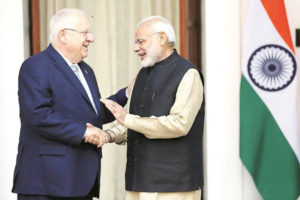
Twenty-five years is a very short period of time, especially in the histories of our two great peoples: two ancient civilisations, nations which achieved their modern liberation now nearly 70 years ago.
But in the quarter of a century of our diplomatic relations to be marked next year Israel and India have reached new heights and achieved new goals which we are right to celebrate.
Today, we are working together in the fields of water conservation, irrigation, innovation and more. We are working to provide the next generations with food security. We are educating Israelis and Indians side by side in our academic institutions.In the fields and in the classroom, we are very literally sowing the seeds for the future.
Moreover, we have both achieved all this in often turbulent regions, and against a backdrop of security threats and challenges.
Many around the world will look at Israel and India, and rather than seeing natural partners they look at the vast differences between our two countries in size; geographic and population.They see that Israel’s population is less than 1% of India’s. They see that India is nearly 500 times bigger than Israel on the map. They consider the gulf in variations between our climates and natural resources. They watch our significantly different market sizes and manufacturing capabilities. And they quite understandably ask themselves what our two economies could possibly have in common. They ask what possible motivation could there be for such high levels of cooperation between Israel and India.
In reality however, these are not differences that divide, they are contrasts that provide synergies. Israel and India are in fact very natural partners in the areas of agriculture, water, and crucially education. A closer look at two crucial elements within our societies, I believe, brings this into sharp focus.
The first is the centrality of the values of democracy and freedom which we share, and upon which our two countries are rooted. The second is the importance we place on education, and crucially academic collaboration as an engine for growth and development.
Firstly , democracy is not just a system of governance. Democracy supported by its crucial tenet of freedom of expression ensures that everyone has a voice. In Israel this has provided fertile ground for innovative thinking and moreover the ability to turn these ideas into reality . Israeli society and democracy says: if you have an idea, try it out. And crucially , if your last idea failed, try another one.
For Israel it was in fact our lack of natural resources that spawned our innovation and technology sector giving birth to solutions and ideas addressing everything from technologies and techniques to turn the swamps into cities and cause the deserts to bloom, to communications, cybersecurity , and treatments for diseases. These are just some of the technologies on which Israelis and Indians are cooperating today . Indeed, on my visit I will be accompanied by a delegation of business, industry and defence leaders looking to explore how we can expand cooperation in these fields and more.
Similarly, in relation to the second key element our focus on academia and education I will also be accompanied by a delegation of presidents and representatives of the top Israeli academic institutions. Our universities and colleges are the building blocks of the start-up ecosystem, and the meeting point between research and innovation and the business sectors. I am delighted to say that Israel is opening the doors of its academic institutions to promote joint research with our Indian counterparts.
Already more than 10% of foreign exchange students in Israel are from India, and the cooperation does not begin and end in the classroom. Students are returning to India and continuing to build these relationships, and going on to share their skills and understanding to help advance the Indian economy .
This is not the only way that Israel is proud to share its knowledge and experience with India. The Indo-Israeli Agricultural Project which is led by the Indian government in partnership with MASHAV (Israel’s international development and cooperation agency) is active in nine states across India, and has 15 fully operational Centers of Excellence with more being planned.
This kind of government backed cooperation is the final piece of the puzzle in strengthening our ties and all time high levels of cooperation. For Israelis too, Prime Minister Narendra Modi’s `Make in India’ initiative provides welcome incentive and encouragement for Israeli businesses looking to scale up their operations into a market with perhaps unparalleled production and consumption capabilities.
Moreover, the Four-Colour Revolution focussing efforts on solar power, dairy production, water conservation and agriculture, has provided welcome direction for many Israelis who have developed significant expertise in these areas, and are committed to partnership with their Indian counterparts.
As I noted, all this has been achieved in less than 25 years. Just imagine what we can achieve in the next 25, or even 50 years. I am deeply honoured by the opportunity to visit India, as we were honoured to host President Pranab Mukherjee last year. We have challenges and we have opportunities, and we must face them together in our words and deeds, as strong and thriving democracies and economies. This is not an opportunity either of us can afford to miss.
Source : http://economictimes.indiatimes.com


















